Ambassador Chapuys - historical profile
Jump to navigation
Jump to search
Chapuys Letters:
| Ambassador Eustace Chapuys and his writings born c. 1490 died 1556 (aged c.66) Click EasyEdit to update this page! (Don't see the EasyEdit button above? <a href="../#signin" target="_self">Sign in</a> or <a href="../accountnew" target="_self">Sign up</a>.) |
INTERESTING FACTS:
|  " Eustace Chapuys, a lawyer from Annecy in Savoy, was not merely a highly efficient and assiduous envoy, writing between 30 and 40 reports a year to the Emperor, plus letters to his officers. Far more important was the length of time he spent n England, he arrived in 1529 and remained until almost the end of Henry VIII's life, retiring only in 1545 at the age of 56. This continuous residence enabled Chapuys to overcome many of the obstacles in the way of an ambassador seeking news. " Eustace Chapuys, a lawyer from Annecy in Savoy, was not merely a highly efficient and assiduous envoy, writing between 30 and 40 reports a year to the Emperor, plus letters to his officers. Far more important was the length of time he spent n England, he arrived in 1529 and remained until almost the end of Henry VIII's life, retiring only in 1545 at the age of 56. This continuous residence enabled Chapuys to overcome many of the obstacles in the way of an ambassador seeking news. In the first place, how was a stranger speaking no English to find informants? It took time to discover sensitively placed individuals who would supply information, or servants who could go out freely enough to be able to verify reports. Moreover, funds did not stretch to the employment of many agents and, in any case, the real secrets were at court. How was an ambassador to succeed there? The answer Chapuys adopted was the answer of the diplomatic manuals: speak french, make yourself persona grata with the elite and news and contacts will come to you. ans this is where his training and experience came in and especially his standing as a humanist and a friend of Erasmus. A man of address, he was worth conversing with and very soon passed everywhere. Even in times of Anglo-imperial tension when another envoy might expect to be cold-shouldered, Chapuys continued to be welcomed as an Individual. Henry VIII clearly enjoyed sparring with this shrewd, brilliant, cynical cosmopolitan." [source: Eric Ives' The life and Death of Anne Boleyn ] |
| Alison Weir in her new Book "The Lady in the Tower" (2009) states: "Chapuys diplomatic reports are among the most important sources for this crucial period, and for generations historians have relied heavily -- and perhaps too trustingly -- upon them. Henry's secretary, Sir William Paget had a poor opinion of the ambassador : " I never took [Chapuys] for a wide man, but for one that used to speak without respect of honesty or truth, so it might serve his turn. He is a great pacticer, tale-telling, lying and flattering". Paget, of course, was biased but it is apparent that Chapuys did sometimes repeat gossip or rumour as fact and saw himself as something of a crusader in the cause of Katherine and Mary, so was unable to view affairs from any other viewpoint. Despite being astute and observant, he sometimes unwittingly relied on information that was deliberately fed to him for political reasons. Moreover, being based around London, and with little knowledge of the further reaches of the realm, he vastly overestimated the lengths to which Henry's subjects would go to uphold the cause of Katherine and Mary. For over a century modern historians have questioned the veracity of Chapuys' testimony, and it has been suggested that he was not as close to events as has been hitherto thought and was therefore and unreliable witness. Yet, that is not entirely true. Chapuys had a difficult role. He did not like England or the English, yet he was obliged to exercise his diplomatic talents in that Kingdom during one of the most tumultuous periods of its history. .....He was not just an eyewitness to many of the events he describes but a shrewd observer. Henry appears to have liked him, although Chapuys angered and irritated him at times". Anne Boleyn | Tudor Historian Eric Ives "Life and Death of Anne Boleyn" goes on to say: "The Professionalism of Charles V's envoys and especially the personality of Eustace Chapuys, come to us clearly over the centuries, and it is easy to succumb to their authority.... We must remember however, that there were pitfalls awaiting even the ablest Ambassador and disadvantages as well as advantages in Chapuys' ready acceptance by English society, and especially by Anne [Boleyn]'s opponents. In the first place, his reporting on the court tends to derive from individuals who share a single point of view and, what is more, pass news on with the gloss which that view gave. Thus, when Chapuys reports bad feeling between Anne and Henry he is relying on informants who wanted to believe that Anne was falling out of royal favour and were ready to see hopeful signs in almost anything. What is more, many of those who spoke to him were out to serve their own agenda. That was certainly true of his official contacts..... An ambassador could also let his own feelings mislead him. In the early 1530's certain conservatives sought to precipitate action by Charles V by claiming the country was a powder keg of resentment against Henry and Anne which awaited only the spark of an imperial invasion. Chapuys reported this enthusiastically because this was exactly what he himself wished to believe, and precisely how he wanted his home government to act. Ambassadors with Chapuys' level of commitment can easily find themselves in the business of self-fulfilling prophecy... The inherent dangers of ambassadorial reports have led some scholars to play down their utility. The difficulty with this is that, denied these reports,much early Tudor history becomes seriously, on occasion impossibly, opaque. The diplomatic reports of Eustace Chapuys, in particular , provide the only relatively continuous commentary on English politics and the royal court .... Hypothesis and speculation must not take the place of carefully evaluated evidence. The professionalism of the historian lies in reading such partisan material critically" |
LINKS:
|
Chapuys Letters:
Chapuys writes about Queen Katherine of Aragon's Last Days: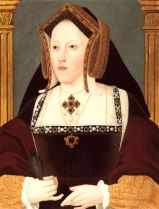 "Catherine had fallen seriously ill in the early winter of 1535, but she seemed to make a good recovery. In late December, however, she had a relapse and her apothecary, Philip Greenacre, wrote a hasty note to the maitre d'hotel of Chapuys's household. The Queen [as of course he persists in calling her] is very ill.....She gets worse every hour, he wrote. For two days and nights she had been unable to keep down either solids or liquids. And she had not slept more than an hour and a half 'for the pain in her stomach'. Chapuys must come immediately, 'for she has lost all her strength'. Another similar letter was written by her doctor Miguel de la Sa...... Sunday, 2 January, Chapuys arrived at the house 'before dinner' and was admitted to see Catherine immediately.... The interview was short and conducted in Spanish. Catherine thanked Chapuys for his services and for his trouble in coming to see her. It would do her good, she thought. If not, 'it would be a consolation to her to die in my arms, and not unprepared, like a beast'. In reply Chapuys tried to keep her spirits up speaking of the better houses and more generous funding which Henry had promised. above all, he assured her, ' the King was very sorry for her illness'. "Catherine had fallen seriously ill in the early winter of 1535, but she seemed to make a good recovery. In late December, however, she had a relapse and her apothecary, Philip Greenacre, wrote a hasty note to the maitre d'hotel of Chapuys's household. The Queen [as of course he persists in calling her] is very ill.....She gets worse every hour, he wrote. For two days and nights she had been unable to keep down either solids or liquids. And she had not slept more than an hour and a half 'for the pain in her stomach'. Chapuys must come immediately, 'for she has lost all her strength'. Another similar letter was written by her doctor Miguel de la Sa...... Sunday, 2 January, Chapuys arrived at the house 'before dinner' and was admitted to see Catherine immediately.... The interview was short and conducted in Spanish. Catherine thanked Chapuys for his services and for his trouble in coming to see her. It would do her good, she thought. If not, 'it would be a consolation to her to die in my arms, and not unprepared, like a beast'. In reply Chapuys tried to keep her spirits up speaking of the better houses and more generous funding which Henry had promised. above all, he assured her, ' the King was very sorry for her illness'. This was a blatant lie. But, in the circumstances, it was a justifiable one. Exhausted by the effort, Catherine asked to be left alone to sleep which she did for a few hours. At 5 o'clock, Dr de la Sa summoned Chapuys who spent more than an hour with her, alone apart from the doctor and Catherine's 'old trusty women'. .... In these conversations, Chapuys was worried about tiring Catherine. But she insisted on prolonging them and their exchanges became more and more frank...... She was worried about More and Fisher - the 'good men [who] had suffered in persons and goods ' - and about the mounting tide of heresy which threatened to engulf England. Such things were anathema to her. But they had arisen because of her steadfastness. Had she, she now asked herself been right? Or was her behaviour a mere selfish intransigence, which God was punishing by visiting these horrors on her adoptive country?...... Catherine's original doubts, however, were right. She had acted her part from the best of motives. And bearing in mind her character, she could scarcely have behaved otherwise. Nevertheless, the awful truth remains that the Reformation, and all it entailed was her work as much as Henry's and Anne's." [Source : David Starkey's Six Wives, The Queens of Henry VIII] |
| May 15th, 1536 - to Emperor Charles V “Hannaert has written to Granvelle on the 9th that he had just heard that the king of England’s concubine [[[Anne Boleyn]]] had been surprised in bed with the King’s organist [[[Mark Smeaton]]]. If this be so, as it is very probable that God has permitted it after her damnable life, we think the King will be more inclined to treat, especially as regards our cousin; but you must use great dexterity lest the King intend a marriage in France, and that he should rather choose one of his own subjects, either the one with whom he is in love or some other. We trust that if there be anything in it you will let us know with diligence. We send letters of credence for you for the dukes of Richmond, Norfolk, and Suffolk, and also for Cromwell, such as you will see by the copies. Pontremulo, 15 May 1536. P.S.—Since the above was written your man George has arrived, who confirms the news touching the King’s concubine, and, as we suppose that the King will put her and her accomplices to death and take another wife, as he is of amorous complexion and always desires to have a male child, and as on the side of France they will not fail to offer him a match, you will suggest, when you can, to him or Cromwell, a marriage with the Infanta of Portugal, daughter of our sister the queen of France, who has 400,000 ducats dowry by testament. Another marriage might be arranged for the Infant Don Loys of Portugal, our brother-in-law, with the princess of England. You must point out to them that these matches would be very expedient, both to remove past scruples and to promote strict amity between us, him, and Portugal, and would be very advantageous to England in case the King should have a male child by this marriage, as he may reasonably hope from the youth and bringing up of the Infanta. If you see the King not inclined to these marriages you might propose one between the King and our niece, the duchess dowager of Milan, a beautiful young lady, well brought up and with a good dowry; treating at the same time of the other marriage between Don Loys and our cousin. But we should greatly prefer the former match with the Infanta, for the good of both, and in order to be able to dispose of our niece of Milan otherwise. Bersel, 15 May 1536.” |
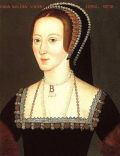 Despite Chapuys's dislike of Anne, his account of Anne Boleyn's Execution gives little credit to the king. Despite Chapuys's dislike of Anne, his account of Anne Boleyn's Execution gives little credit to the king. He clearly considered Henry's behavior to be inappropriate; it was also unpopular: "The joy shown by the people every day, not only at the ruin of the concubine but at the hope of princess Mary's restoration is inconceivable, but as yet the king shows no great disposition towards the latter; indeed he has twice shown himself obstinate when spoken to on the subject by his council. I hear that, even before the arrest of the concubine, the king, speaking with Mistress Jane Seymour of their future marriage, the latter suggested that the princess should be replaced in her former position; and the king told her she was a fool, and ought to solicit the advancement of the children they would have between them, and not any others. She replied that in asking for the restoration of the princess she was seeking the rest and tranquility of the king, herself, her future children, and the whole realm; for, without that neither your majesty nor this people would ever be content. I will endeavor by all means to make her continue in this vein; I hope also to go and speak with the king within three days, and with members of the council in general. I think the concubine's little bastard Elizabeth will be excluded from the succession, and that the king will get himself requested by parliament to marry. To cover the affection he has for the said Seymour he has lodged her seven miles away in the house of a grand esquire, and says publicly that he has no desire in the world to marry again, unless he is constrained by his subjects to do so. Several have already told me and sent to say that, if it cost them their lives, when parliament meets they will urge the cause of the princess to the utmost. The very evening the concubine was brought to the Tower of London, when the duke of Richmond went to say goodnight to his father, and ask his blessing after the English custom, the king began to weep, saying that he and his sister, meaning the princess, were greatly bound to God for having escaped the hands of that accursed *****, who had determined to poison them; from which it is clear that the king knew something about it. Master Norris, the king's chief butler, Master Weston who used to lie with the king, Master Brereton gentleman of the chamber, and the groom of whom I wrote to your majesty by my man, were all condemned as traitors. Only the groom confessed that he had been three times with the said ***** and concubine. The others were condemned upon presumption and certain indications, without valid proof or confession. The concubine and her brother were condemned for treason by all the principal lords of England, and the duke of Norfolk pronounced sentence. I am told the earl of Wiltshire was quite as ready to assist at the judgement as he had done at the condemnation of the other four. Neither the ***** nor her brother was brought to Westminster like the other criminals. They were condemned within the Tower of London, but the thing was not done secretly, for there were more than 2,000 persons present. What she was principally charged with was having cohabited with her brother and other accomplices; that there was a promise between her and Norris to marry after the king's death, which it thus appeared they hoped for; and that she had received and given to Norris certain medals, which might be interpreted to mean that she had poisoned the late queen, and intrigued to do the same to the princess. | These things she totally denied and gave to each a plausible answer. Yet she confessed she had given money to Weston, as she had often done to other young gentlemen. She was also charged, and her brother likewise, with having laughed at the king and his dress, and that she showed in various ways she did not love the king, but was tired of him. Her brother was charged with having cohabited with her by presumption, because he had once been found a long time with her, and with certain other little follies. To all he replied so well that several of those present wagered 10 to 1 that he would be acquitted, especially as no witnesses were produced against either him or her, as it is usual to do, particularly when the accused denies the charge. I must not omit that among other things charged against him as a crime was, that his sister had told his wife that the king was impotent. This he was not openly charged with, but it was shown him in writing, with a warning not to repeat it. But he immediately declared the matter, in great contempt of Cromwell and some others, saying he would not in this point arouse any suspicion which might prejudice the king's issue. He was also charged with having spread reports which called in question whether his sister's daughter was the king's child. To which he made no reply. They were judged separately and did not see each other. The concubine was condemned first, and having heard the sentence, which was to be burnt or beheaded at the king's pleasure, she preserved her composure, saying that she held herself ready to greet death and that what she regretted most was that the above persons, who were innocent and loyal to the king, were to die for her. She only asked a short time for confession. Her brother, after his condemnation, said that since he must die, he would no longer maintain his innocence, but confessed that he had deserved death. He only begged the king that his debts, which he recounted, might be paid out of his goods. Although everybody rejoices at the execution of the ***** there are some who murmur at the mode of procedure against her and the others, and people speak variously of the king; and it will not pacify the world when it is known what has passed and is passing between him and Jane Seymour. Already it sounds ill in the ears of the people, that the king, having received such ignominy, has shown himself more glad than ever since the arrest of the *****; for he has been going about banqueting with ladies, sometimes remaining after midnight, and returning by the river. Most of the time he was accompanied by various musical instruments, and, on the other hand, by the singers of his chamber, which many interpret as showing his delight at getting rid of a thin, old and wicked fool with hope of change, which is a thing especially agreeable to this king. He supped lately with several ladies in the house of the bishop of Carlisle, and showed an extravagant joy, as the said bishop came to tell me next morning, who reported moreover that the king had said to him, among other things, that he had long expected the issue of these affairs, and that thereupon he had before composed a tragedy, which he carried with him; and so saying the king drew from his bosom a little book written in his own hand, but the bishop did not read the contents. It may have been certain ballads that the king had composed, at which the ***** and her brother laughed as foolish things, which was objected to them as a great crime. Three days after the concubine's imprisonment the princess was removed, and was honourably accompanied both by the servants of the little bastard and by several gentlemen who came of their own accord. Many of her old servants and maids at this news went to her, and although her governess allowed them to remain, she was warned by me not to accept or retain anyone but those given her by the king her father. What I most fear as regards her is, that when the king is asked by parliament to restore her to her rights, he will refuse his consent unless the princess first swears to the statutes invalidating the first marriage and the pope's authority. To this, I think, she will not easily yield, although I should advise her to acquiesce in everything as far as she can without prejudice to her conscience." |
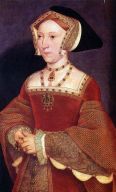 Jane Seymour found herself courted, not only by King Henry VIII, but also by Anne Boleyn's enemies and Ambassador Chapuys Jane Seymour found herself courted, not only by King Henry VIII, but also by Anne Boleyn's enemies and Ambassador Chapuys [ *See the "Tudor Court Politics" page on the wiki] “The Grand Ecuyer, Mr. Caro [Sir Nicholas Carew], had on St. George’s day the Order of the Garter in the place of the deceased M. de Burgain (lord Abergavenny), to the great disappointment of Rochford, who was seeking for it, and all the more because the Concubine has not had sufficient influence to get it for her brother; and it will not be the fault of the said Ecuyer if the Concubine, although his cousin (quelque, qu. quoique? cousine) be not dismounted. He continually counsels Mrs. Semel [[[Jane Seymour]]] and other conspirators “pour luy faire une venue,” and only four days ago he and some persons of the chamber sent to tell the Princess to be of good cheer, for shortly the opposite party would put water in their wine, for the King was already as sick and tired of the concubine as could be; and the brother of lord Montague told me yesterday at dinner that the day before the bishop of London had been asked if the King could abandon the said concubine, and he would not give any opinion to anyone but the King himself, and before doing so he would like to know the King’s own inclination, meaning to intimate that the King might leave the said concubine, but that, knowing his fickleness, he would not put himself in danger. The said Bishop was the principal cause and instrument of the first divorce, of which he heartily repents, and would still more gladly promote this, the said concubine and all her race are such abominable Lutherans. London, 29 April 1536.” "Jane certainly acted upon this advice, and it had the desired effect upon the King, who was now receptive to criticism of his wife. Jane also followed her own instincts, and the advice of her friends, by not admitting Henry to her bed. Instead, she dropped heavy hints about marriage, which fell on fertile ground, and before long Henry began to behave towards her with great circumspection, leading others to believe that he was already considering her as a future wife. From this time on, he took care to avoid any hint of scandal attaching itself to her name; her family and adherents were quick to notice this new deference on the part of the King, and Sir Francis Bryan told Jane's parents that they would shortly see their daughter 'well bestowed' in marriage" [Source: Alison Weir, The Six Wives of Henry VIII, p. 306]. | 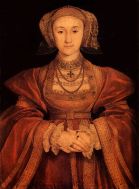 Chapuys' account of Anne of Cleves first meeting with Henry: Chapuys' account of Anne of Cleves first meeting with Henry:1539 This year on St John's Day, 27 December, Lady Anne, daughter of the duke of Cleves in Germany, landed at Dover at 5 o'clock at night, and there was honorably received by the duke of Suffolk and other great lords, and so lodged in the castle. And on the following Monday she rode to Canterbury where she was honorably received by the archbishop of Canterbury and other great men, and lodged at the king's palace at St Austin's, and there highly feasted. On Tuesday she came to Sittingbourne. 1540 On New Year's Eve the duke of Norfolk with other knights and the barons of the exchequer received her grace on the heath, two miles beyond Rochester, and so brought her to the abbey of Rochester where she stayed that night and all New Years Day. And on New Years Day in the afternoon the king's grace with five of his privy chamber, being disguised with mottled cloaks with hoods so that they should not be recognized, came secretly to Rochester, and so went up into the chamber where the said Lady Anne was looking out of a window to see the bull-baiting which was going on in the courtyard, and suddenly he embraced and kissed her, and showed here a token which the king had sent her for New Year's gift, and she being abashed and not knowing who it was thanked him, and so he spoke with her. But she regarded him little, but always looked out the window.... and when the king saw that she took so little notice of his coming he went into another chamber and took off his cloak and came in again in a coat of purple velvet. And when the lords and knights saw his grace they did him reverence.... and then her grace humbled herself lowly to the king's majesty, and his grace saluted her again, and they talked together lovingly, and afterwards he took her by the hand and led her to another chamber where their graces amused themselves that night and on Friday until the afternoon. ....So she came to Greenwich that night, and was received as queen. And the next day, being Sunday, the king's grace kept a great court at Greenwich, where his grace with the queen offered at mass, richly dressed. And on Twelfth Night, which was Tuesday, the king's majesty was married to the said queen Anne solemnly, in her closet at Greenwich, and his grace and she went publicly in procession that day, she having a rich coronet of stone and pearls set with rosemary on her hair, and a gown of rich cloth of silver, richly hung with stones and pearls, with all her ladies and gentlewomen following her, which was a goodly sight to behold. |
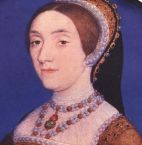 The fall of Katherine Howard recorded by Eustace Chapuys The fall of Katherine Howard recorded by Eustace ChapuysCulpepper's position saved him from Dereham/Dorand's gruesome fate. Please note: Chapuys inaccurately uses the name 'Dorand' to refer to Francis Dereham: "This year on 13 Nov Sir Thomas Wriothesley, secretary to the King, came to Hampton Court to the queen, and called all the ladies and gentlewomen and her servants into the great chamber, and there openly before them declared certain offenses she had committed in misusing her body with certain persons before the king's time, because of which he there discharged all her household; and the morning after she was taken to Sion, with my Lady Bainton and two other gentlewomen and certain of her servants to wait on her there until the king's further pleasure. And various people were taken to the Tower of London, such as my Lady Rochford, Master Culpepper, one of the king's privy chamber, and others. On 1 December Thomas Culpepper, one of the gentlemen of the king's privy chamber, and Francis Dorand, gentleman, were arraigned at the Guildhall in London, for high treason against the king's majesty, in misdemeanor with the queen, as appeared by their indictment which they confessed to, and they were sentenced to be drawn, hanged, and quartered, the lord mayor sitting there as chief, the lord chancellor on his right hand, and the Duke of Norfolk on his left hand, the Duke of Suffolk, the lord privy seal, the earls of Sussex, of Hertford, and various others of the king's council sitting with all the judges also in commission that day. And on 10 December the said Culpepper and Dorand were drawn from the Tower of London to Tyburn, and there Culpepper, after exhorting the people to pray for him, stood on the ground by the gallows, knelt down and had his head struck off; and then Dorand was hanged, dismembered, disemboweled, beheaded and quartered. Culpepper's body was buried at St Sepulchre's church near Newgate, and their heads were set on London Bridge." | Aftermath of Katherine Howard's execution: "...by the winter of 1541-2, the ambassador [Chapuys] had known Henry for a dozen years. He had seen him change from a fit, if florid, forty-year-old to the prematurely aged and bloated monster he had become a decade later. He had witnessed his reaction to Anne Boleyn's execution and to Jane Seymour's death. But he had never seen him behave as he did over Catherine Howard. 'This King', he reported on 3 December 1541, 'has wonderfully felt the case of the Queen, his wife.' 'He has certainly shown', he continued 'greater sorrow and regret at her loss than at the faults, loss or divorce of his preceding wives'. ,, Indeed, the contrast was so great that Chapuys felt the need to offer what we might call a little psychology to explain it. He did so by means of a homely comparison. 'I should say'. he wrote. 'that the King's case resembles very much that of a woman who cried more bitterly at the loss of her tenth husband than she had cried on the death of the other nine put together, through all of though all of them had been equally worthy people and good husbands to her.' 'The reason', Chapuy's tale continued. '[was] that she had never buried one of them without being sure of the next. But after the tenth husband she had no other one in view, hence her sorrow and her lamentation.' 'Such', Chapuys concluded, 'is the case with this King, who does not seem to have any plan or female friend to fall back upon.' It can be put more simply. Previously, with the exception of that ever-sainted Jane Seymour, Henry had abandoned his wives. Now, he felt, a wife had abandoned him. He did not like it." [source : David Starkey's Six Wives] |
